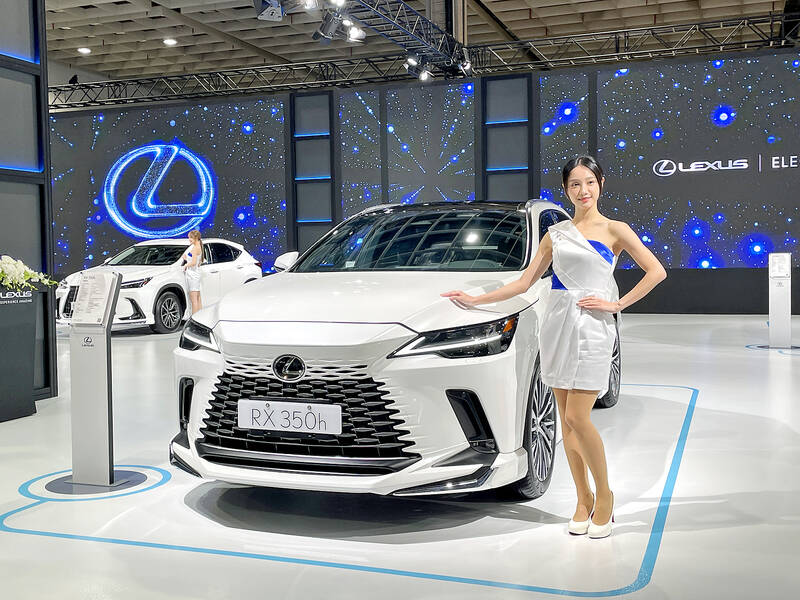New car sales in Taiwan last year rose 11 percent to the highest level in 18 years, government data released yesterday showed.
The number of applications for vehicle license plates, an indicator of new car sales, grew to 476,987 units last year, from 429,731 units in 2022, the highest level since 2005, when 514,626 units were sold, data compiled by the Ministry of Transportation and Communications showed.
The full-year results came as vehicle sales last month rose 3.1 percent year-on-year to 43,161 units, boosted by promotion campaigns by automakers and dealers coupled with new arrivals of imported models, the data showed.

Photo: Amy Yang, Taipei Times
Market leader Hotai Motor Co (和泰汽車), which distributes Toyota and Lexus vehicles in Taiwan, attributed the strong results last year to delayed orders from 2022 due to the COVID-19 pandemic and the easing of a chip shortage.
With most of the delayed orders fulfilled, the market is expected to return to normal this year, Hotai said in a statement.
Despite uncertainties related to the nation’s presidential election and tension across the Taiwan Strait, vehicle sales this month are forecast to reach 47,000 units, up 35 percent year-on-year with promotions ahead of the Lunar New Year holiday, it said.
The Lunar New Year, traditionally the most important holiday in the year, falls on Feb. 10 this year.
Hotai reported sales of 14,654 units last month and 159,175 units for the year, which was an 11.5 percent increase from the previous year and the highest in the company’s history.
It has been the No. 1 vendor in Taiwan for 22 consecutive years with a market share of 33.4 percent, Hotai said.
Among the top 10 brands, six reported sales growth last year, with Lexus posting the largest increase, at 55.6 percent to 30,065 units in annual sales, followed by Hyundai at 44 percent to 22,175 units, the data showed.
Toyota led the market, selling 129,110 units, up 4.6 percent from a year earlier, followed by Honda, with an 11.1 percent increase in sales to 30,420 units. Mercedes-Benz’s sales rose 4.5 percent to 24,439 units, while BMW’s sales rose 6 percent to 17,725 units.
In contrast, Nissan, Ford, China Motor Corp (中華汽車) and Mitsubishi reported declines of 5.8 percent to 12.9 percent in sales, compared with a year earlier, the data showed.

COMPETITION: AMD, Intel and Qualcomm are unveiling new laptop and desktop parts in Las Vegas, arguing their technologies provide the best performance for AI workloads Advanced Micro Devices Inc (AMD), the second-biggest maker of computer processors, said its chips are to be used by Dell Technologies Inc for the first time in PCs sold to businesses. The chipmaker unveiled new processors it says would make AMD-based PCs the best at running artificial intelligence (AI) software. Dell has decided to use the chips in some of its computers aimed at business customers, AMD executives said at CES in Las Vegas on Monday. Dell’s embrace of AMD for corporate PCs — it already uses the chipmaker for consumer devices — is another blow for Intel Corp as the company

ADVANCED: Previously, Taiwanese chip companies were restricted from building overseas fabs with technology less than two generations behind domestic factories Taiwan Semiconductor Manufacturing Co (TSMC, 台積電), a major chip supplier to Nvidia Corp, would no longer be restricted from investing in next-generation 2-nanometer chip production in the US, the Ministry of Economic Affairs said yesterday. However, the ministry added that the world’s biggest contract chipmaker would not be making any reckless decisions, given the weight of its up to US$30 billion investment. To safeguard Taiwan’s chip technology advantages, the government has barred local chipmakers from making chips using more advanced technologies at their overseas factories, in China particularly. Chipmakers were previously only allowed to produce chips using less advanced technologies, specifically

MediaTek Inc (聯發科) yesterday said it is teaming up with Nvidia Corp to develop a new chip for artificial intelligence (AI) supercomputers that uses architecture licensed from Arm Holdings PLC. The new product is targeting AI researchers, data scientists and students rather than the mass PC market, the company said. The announcement comes as MediaTek makes efforts to add AI capabilities to its Dimensity chips for smartphones and tablets, Genio family for the Internet of Things devices, Pentonic series of smart TVs, Kompanio line of Arm-based Chromebooks, along with the Dimensity auto platform for vehicles. MeidaTek, the world’s largest chip designer for smartphones

BRAVE NEW WORLD: Nvidia believes that AI would fuel a new industrial revolution and would ‘do whatever we can’ to guide US AI policy, CEO Jensen Huang said Nvidia Corp cofounder and chief executive officer Jensen Huang (黃仁勳) on Tuesday said he is ready to meet US president-elect Donald Trump and offer his help to the incoming administration. “I’d be delighted to go see him and congratulate him, and do whatever we can to make this administration succeed,” Huang said in an interview with Bloomberg Television, adding that he has not been invited to visit Trump’s home base at Mar-a-Lago in Florida yet. As head of the world’s most valuable chipmaker, Huang has an opportunity to help steer the administration’s artificial intelligence (AI) policy at a moment of rapid change.